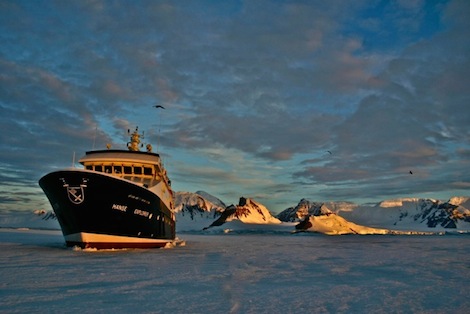No prizes for the Polar Code
From 14 to 23 May, 2014, the IMO held its 93rd Maritime Safety Committee meeting, which saw the approval of a draft Polar Code. However, industry response suggests the Code hasn't covered enough ground to ensure the safe operation of yachts and other vessels in the Polar regions.…
A notable adopted amendment was that of mandatory audit schemes for the STCW, the Protocol of 1988 relating to the International Convention on Load Lines, 1966 and SOLAS, 1974. Consequently, the IMO Instruments Implementation Code (III Code) and auditing of parties to the above-mentioned treaties will be compulsory. The sub-committee for the Code was also instructed to complete consideration of the report on the 2012 grounding of Costa Concordia and will upload ‘lessons learned’ to the IMO’s Global Integrated Shipping Information System (GISIS).
Additional amendments to SOLAS, expected to enter into force on 1 January, 2016, included those concerning regulation II-1/29 on steering gear in sea trials and SOLAS regulation II-2/13.4, mandating additional means of escape from machinery spaces. Meanwhile, the MSC also adopted the following: amendments to the International Life-Saving Appliance (LSA) Code related to the testing of lifejackets (also entering into force on 1 January, 2016); and a revised action plan for passenger ship safety, while issues including damage stability, survivability of passenger ships, watertight doors, the consideration of double-hull requirements and the consideration of amendments to require damage control drills for passenger ships were referred to the sub-committee on Ship Design and Construction (SDC).
It was the MSC’s approval of a draft Polar Code, however, that has the industry talking. The MSC approved for consideration a new SOLAS chapter XIV, entitled ‘Safety measures for ships operating in polar waters’, which would make mandatory the introduction and part I-A of the International Code for Ships Operating in Polar Waters (or, the Polar Code) and is expected to be formally adopted at its November 2014 session. The draft Code covers design, construction, equipment, operational training, environmental protection and search and rescue matters relevant to those ships operating in waters surrounding the two poles.
For some, however, the meeting’s discussions did not delve deep enough into these complex waters. Maritime union Nautilus International was present at the meeting and told SuperyachtNews.com that even this final draft fell far below the required standards for vessels operating in these waters. “There is a continued concern and alarm, even following the revised draft of the Code, in that vessels including yachts will be present in what can be inhospitable waters [and] are clearly not constructed or designed with passengers in mind, with fears that existing requirements for life-saving appliances are inadequate,” said Garry Elliott, senior national secretary and head of recruitment and membership at Nautilus. “The union believes that the final draft of the Polar Code falls far below the standard required to ensure the safety of yachts and protection of the environment in Polar regions. It should go without saying that the largest risk to persons having been forced to abandon a vessel in the Polar regions would be exposure to the elements, however the SOLAS requirement that a passenger vessel need only have lifeboat capacity for 75 per cent of persons on board has not been addressed in the draft Polar Code.”
Elliott added that the Code allows vessels to operate in supposedly ice-free waters with no additional training for any of the senior crew, while waters with up to 10 per cent ice coverage only require very basic training. “The shortcomings of the draft Polar Code are well recognised and confirms that this prolonged process has been little more than a paper exercise to justify the present arrangements, and so avoid necessary and precautionary change."
Also discussed at the 93rd session was the maritime industry’s progress regarding piracy and armed robbery, with the MSC noting the number of worldwide attacks had significantly decreased, while concern remained pertaining to the Gulf of Guinea. Lifeboat safety was another topic tackled, with the MSC noting a number of inconsistencies between the requirements of the draft amendments to SOLAS regulations III/3 and the related draft MSC resolution; consequently the draft amendments have been referred to the sub-committee on Ship Systems and Equipment (SSE) for further consideration. Meanwhile, additional topics covered included a call for clarification on the International Convention on Tonnage Measurement of Ships, 1969; the adoption of a number of new traffic routing systems; approved guidance on the bridge navigational watch alarm system (BNWAS) auto function, and an agreement to instruct the SDC sub-committee to develop amendments to SOLAS’ Fire Safety Systems code to make evacuation analysis mandatory for new passenger ships and review the evacuation recommendations for new and existing passenger ships.
NEW: Sign up for SuperyachtNewsweek!
Get the latest weekly news, in-depth reports, intelligence, and strategic insights, delivered directly from The Superyacht Group's editors and market analysts.
Stay at the forefront of the superyacht industry with SuperyachtNewsweek
Click here to become part of The Superyacht Group community, and join us in our mission to make this industry accessible to all, and prosperous for the long-term. We are offering access to the superyacht industry’s most comprehensive and longstanding archive of business-critical information, as well as a comprehensive, real-time superyacht fleet database, for just £10 per month, because we are One Industry with One Mission. Sign up here.
NEW: Sign up for
SuperyachtNewsweek!
Get the latest weekly news, in-depth reports, intelligence, and strategic insights, delivered directly from The Superyacht Group's editors and market analysts.
Stay at the forefront of the superyacht industry with SuperyachtNewsweek




